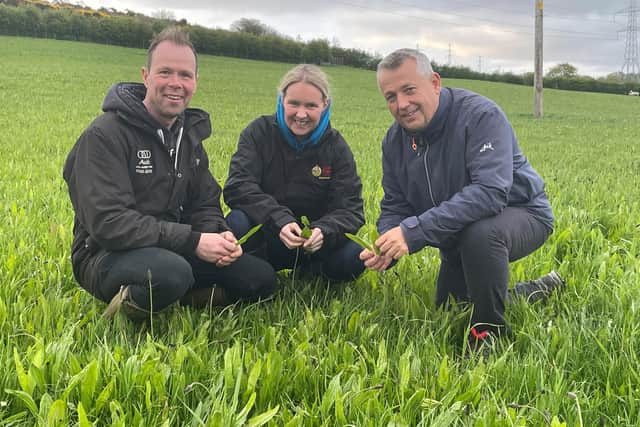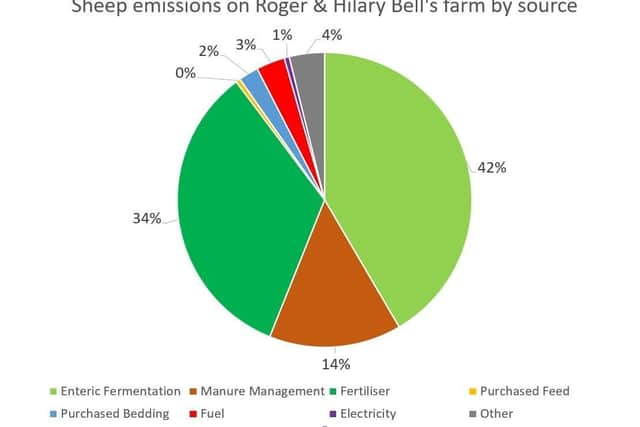How to measure carbon on the farm
and live on Freeview channel 276
Join the first in a series of farm walks on the subject on Tuesday 31st May 2022 on the farm of Roger and Hilary Bell who run a flock of 500 ewes near Kells, Co Antrim.
ARCZero is comprised of seven innovative farmers from across Northern Ireland together with academic and industry partners including Devenish, Queen’s University, AgriSearch and Birnie Consultancy. During this series of farm walks which will be held in the coming months you’ll hear from the ARCZero farmers and their journey so far.
Advertisement
Advertisement
Like the other six ARCZero farms, a comprehensive carbon benchmarking exercise has been completed on the Bell farm using SRUC’s Agrecalc tool. This tool breaks down carbon emissions into the three constituent gases: Carbon dioxide, Methane and Nitrous Oxide. The Agrecalc tool can also split emissions between enterprises allowing for a whole farm approach to be taken. In the Bell’s case this splits the emissions between their Sheep and Beef enterprises.


The total gross emissions from the farm amounts to 820 tonnes of CO2e (22 kg CO2e / kg dwt). However, this is only part of the story. What is less often talked about is a farms ability to sequester carbon. The Agrecalc soil carbon tool has estimated that the Bell’s farm sequesters 456 tonnes of CO2e into his soil each year. This leaves them with net emissions of 365 tonnes CO2e, equating to a carbon intensity of just 12 kg CO2e / kg dwt and 55% less than his gross emissions.
To get a more accurate picture of the carbon stocks on the ARCZero farms a comprehensive soil survey was done which measure carbon stocks from 0-10cm and 0-30 cm with soil nutrient analysis and soil texture classification also undertaken. Soils were categorised by a number of different factors including: organic matter content, land use, manure application, and whether grassland was grazed or cut and on the sward type.
In addition, a LIDAR survey was taken to measure above ground carbon in the form of trees and hedges. This revealed that 13,885t of carbon is stored in Hugh’s soils and a further 188.4t is stored in his trees and hedges. When converted to CO2 equivalents this amount to 51,507 t of CO2e of above and below ground carbon stocks. The work done by ARCZero has highlighted the fact that farmers are the custodians of the nation’s carbon.
Advertisement
Advertisement
A more in-depth analysis of Roger and Hilary Bell’s net carbon balance will be given at the farm walk on the 31st May with expert speakers from Queen’s University and CAFRE, with scientific outputs from AFBI also being presented.


While the Bell’s gross emissions are 28% lower than the average of all sheep farms who have benchmarked with AgreCalc they are not resting on their laurels and are taking steps to further improve thier carbon footprint by sowing multi-species swards to lower reliance on manufactured fertilisers and improve soil health. They are also managing their hedges in a manner which will further increase the rates of carbon sequestration.
Members of the Multi-Species Swards for Beef and Sheep EIP Group will be participating in the farm walk and sharing their experiences of establishing and managing multi-species swards. Professor John Gilliland will also outline interim results from the Heartlands project at the Devenish Lands at Dowth.
Farm walks will leave at regular intervals during the afternoon (3pm and 3.30pm) and evening (7pm and 7.30pm) on 31st May. Everyone is welcome but pre-registration is required and can be done via the ARCZero website: www.arczeroni.org.
Further ARCZero farm walks will take place on Friday 17th June on the farm of Simon Best, Poyntzpass and Tuesday 21st June on the farm of John Egerton, Rosslea.